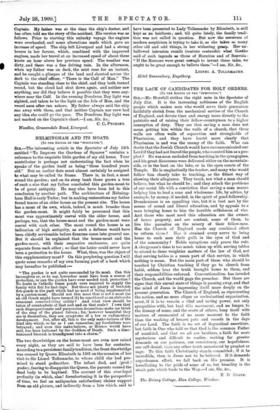THE LACK OF CA.NDLDATES FOR HOLY ORDERS.
[TO THE EDITOR OF THE "SPECTATOR."1
SIR,—Mr. florsfall strikes the right note in the Spectator of July 21st. It is the increasing nobleness of the English people which makes men who would serve their generation faithfully shrink from the mechanical service of the Church of England, and devote time and energy more directly to the patriotic end of raising their fellow-countrymen to a higher conception of duty. They see that saving a man does not mean getting him within the walls of a church, that these walls are often walls of separation and strongholds of Pharisaism, and they have learnt more clearly that Pharisaism is and was the enemy of the faith. Who can doubt that the Jewish Church would have excommunicated our Lord if they had not feared the people, who counted him as a pro- phet? He was soon excluded from teaching in the synagogues, and his great discourses were delivered either on the mountain- side, or in the boat on the lake, or in the open courts of the Temple. He is emphatically the teacher, and many who would follow him closely take to teaching, as the fittest way of showing their allegiance. They teach, not what a man should believe, but what he should be ; and they attack the problems of our social life with a conviction that saving a man means helping him to lead a sane and wholesome life, by advice, by example, by money, if needed, in the spirit of good-fellowship. Drunkenness is an appalling vice, but it is best met by the means of sound and liberal education, and by appeals to a man bringing home to him the horrible selfishness of vice And those who most need this education are the owners of house property, and are content, some of them, to live like parasites on the misery of their fellow-men. Has the Church of England made any combined effort to reform them ? Has it strained every nerve to bring home to such men their guilt in the eyes of God and of the community ? Noble exceptions only prove the rule. A clergyman's time is too much taken up with serving tables to attend to these weightier matters of the law of God, not that serving tables is a mean part of that service, in which nothing is mean. But the main part of those who should be touched by Christian teaching if they go to church from habit, seldom hear the truth brought home to them, and their responsibilities enforced. Conventionalism has invaded the Church, and the world gags the preacher. But there are signs that this unreal state of things is passing away, and that the mind of Jesus is impressing itself more deeply on the present generation. The Church of England, as representing the nation, and no mere clique or ecclesiastical organisation, must, if it is to remain a vital and saving power, not only sympathise with, but lead this movement, and no longer, to the dismay of some, and the scorn of others, busy itself with matters of ceremonial of no more moment to the faith than the washing of brazen pots and vessels in the days of our Lord. The faith is no set of dogmatical assertions, but faith in One who told us that God is the common Father of mankind, and that we all are brothers, a faith far more mysterious and difficult to realise, making far greater demands on our patience, our consistency, our hopefulness, our self-denial, than any other truth announced by prophet or sage. To this faith Christianity stands committed ; if it be incredible, then is Jesus not to be believed. If it demands superhuman effort, we fall back on His promise. It is humiliating to the pride of some of us, but humility is the strait gate which leads to the Way.—I am, Sir, &c., E. D STONE.
The Briary Cottage, Eton College, Windsor.


































 Previous page
Previous page